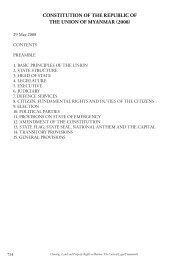Myanmar at the HLP Crossroads: - Displacement Solutions
Myanmar at the HLP Crossroads: - Displacement Solutions
Myanmar at the HLP Crossroads: - Displacement Solutions
You also want an ePaper? Increase the reach of your titles
YUMPU automatically turns print PDFs into web optimized ePapers that Google loves.
21<strong>Myanmar</strong> <strong>at</strong> <strong>the</strong> <strong>HLP</strong> <strong>Crossroads</strong>work. In particular, a new legal framework is needed to address vital issues of land ownership, land reform tobenefit landless families, protection against forced displacement through far more strict interpret<strong>at</strong>ions of compulsoryacquisition powers by <strong>the</strong> St<strong>at</strong>e, <strong>the</strong> provision of compens<strong>at</strong>ion in <strong>the</strong> event of acquisition of property by <strong>the</strong>St<strong>at</strong>e, recognition of customary land and shifting cultiv<strong>at</strong>ors, and <strong>the</strong> development of dispute resolution proceduresand o<strong>the</strong>r mechanisms designed to build in a pro-poor bias within <strong>the</strong> <strong>HLP</strong> legisl<strong>at</strong>ive framework in a manner th<strong>at</strong>can co-exist with o<strong>the</strong>r measures in support of priv<strong>at</strong>e and St<strong>at</strong>e investment.A formalized, mand<strong>at</strong>ory process for adopting legisl<strong>at</strong>ion must be established th<strong>at</strong> istransparent and consult<strong>at</strong>ive and th<strong>at</strong> fosters thorough discussion and open deb<strong>at</strong>e.Some welcome and positive steps were taken toward transparency in <strong>the</strong> process of adopting <strong>the</strong> rel<strong>at</strong>ively narrowrecent <strong>HLP</strong> legisl<strong>at</strong>ion. There is also a growing, robust public discussion around <strong>HLP</strong> rights. However, it is clearth<strong>at</strong> <strong>the</strong>re are some large and fundamental legisl<strong>at</strong>ive issues, involving both process and substantive rights, th<strong>at</strong>must be addressed if an approach th<strong>at</strong> meaningfully addresses <strong>HLP</strong> rights is to be implemented. While <strong>the</strong> Governmentis to be commended for advancing <strong>the</strong> rule of law and taking initial steps to address <strong>HLP</strong> issues, including<strong>the</strong> recently established rule of law parliamentary committee headed by Aung San Suu Kyi, <strong>the</strong>re are backgroundprinciples of legisl<strong>at</strong>ive process th<strong>at</strong> are so flawed th<strong>at</strong> it is impossible to gener<strong>at</strong>e confidence in <strong>the</strong> process orresult. Moreover, <strong>the</strong> recent hastily conceived and approved <strong>HLP</strong> legisl<strong>at</strong>ion of March 2012 does little, if anything,to substantively advance <strong>HLP</strong> rights.If <strong>HLP</strong> and o<strong>the</strong>r human rights are to be fully realized and <strong>the</strong> rule of law is to be respected, <strong>Myanmar</strong> shouldbuild upon <strong>the</strong> beginnings of a consult<strong>at</strong>ive process witnessed in <strong>the</strong> development of <strong>the</strong> Farmland Law, andadopt a formal set of steps th<strong>at</strong> must be taken in <strong>the</strong> development of legisl<strong>at</strong>ion th<strong>at</strong> fosters transparency,consult<strong>at</strong>ion and robust public and legisl<strong>at</strong>ive deb<strong>at</strong>e. This approach should be taken with all legisl<strong>at</strong>ion so th<strong>at</strong>,as it continues to move toward a n<strong>at</strong>ion characterized by respect for <strong>the</strong> rule of law, <strong>the</strong> <strong>Myanmar</strong> Governmentin fact becomes a model of democr<strong>at</strong>ic governance.While <strong>the</strong> consult<strong>at</strong>ion and public discussion th<strong>at</strong> led up to <strong>the</strong> adoption of <strong>the</strong> Farmland Law is to be applaudedfor breaking with <strong>the</strong> previous long-standing lack of Government transparency, <strong>the</strong>se measures fall far short of <strong>the</strong>kind of transparency and public discussion and deb<strong>at</strong>e th<strong>at</strong> is appropri<strong>at</strong>e in a country th<strong>at</strong> respects <strong>the</strong> rule of law.In fact, <strong>the</strong> minimal transparency and public discussion regarding <strong>the</strong> adoption of <strong>the</strong> new Farmland Law was verymuch <strong>the</strong> exception r<strong>at</strong>her than <strong>the</strong> rule. Indeed, <strong>the</strong>re has been recent public discussion by Government officials of<strong>the</strong> need to amend <strong>the</strong> Farmland Law. However, <strong>the</strong>y have been silent on <strong>the</strong> content of any contempl<strong>at</strong>ed amendments.(12) And in ano<strong>the</strong>r glaring example, <strong>the</strong> new n<strong>at</strong>ional Human Rights Commission – a body with <strong>the</strong> capacityto make an important contribution to democr<strong>at</strong>iz<strong>at</strong>ion and <strong>the</strong> rule of law – has drafted a new Human Rights Billand submitted <strong>the</strong> language to <strong>the</strong> President. However, under current norms, <strong>the</strong> draft cannot be circul<strong>at</strong>ed until ithas actually been adopted by <strong>the</strong> legisl<strong>at</strong>ure. It is particularly ironic th<strong>at</strong> <strong>the</strong> development of human rights legisl<strong>at</strong>ionis being undertaken with such a flagrant lack of transparency, itself an approach th<strong>at</strong> undermines <strong>the</strong> rule of law.A new <strong>HLP</strong> law must start from <strong>the</strong> premise th<strong>at</strong> everyone in <strong>Myanmar</strong> must have clear,strong and enforceable security of tenure rights, both in rural and urban areas.Law-makers may wish to seek guidance from <strong>the</strong> 2012 UN voluntary guidelines on land tenure, which provide anexhaustive range of relevant tenure issues. (13) Special consider<strong>at</strong>ion should also be given to <strong>the</strong> lengthy, bottom-upprocess leading to <strong>the</strong> Urban Reform Law of Brazil (<strong>the</strong> ‘City St<strong>at</strong>ute’) th<strong>at</strong> has led to <strong>the</strong> extraordinary pro-peopletransform<strong>at</strong>ion of many of Brazil’s largest cities. There needs to be a stable, easily accessible and non-corruptsystem in place providing security of tenure within any new <strong>HLP</strong> law.(12) See, “Farmland Laws Should be Amended: Committee,” in <strong>Myanmar</strong> Times, 25 June 2012.(13) FAO Voluntary Guidelines on <strong>the</strong> Responsible Governance of Tenure of Land, Fisheries and Forests in <strong>the</strong> Context of N<strong>at</strong>ional Food Security(11 May 2012).













